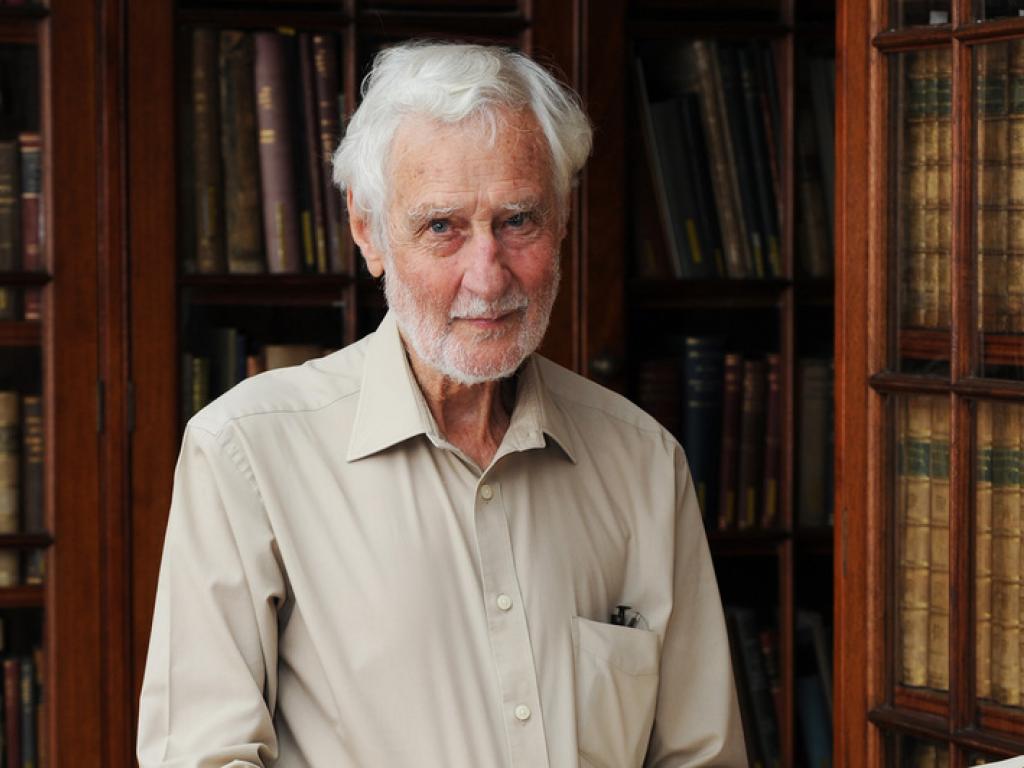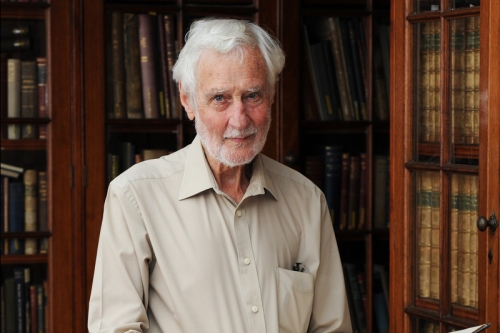Professor Michael Feast: 1926–2019


Michael William Feast died peacefully early on the morning of 1 April 2019, aged 92. He is survived by his wife Connie, three children and eight grand-children.
Michael was an honorary professor in the Department of Astronomy at the University of Cape Town from 1992, and he was awarded a DSc (honoris causa) by UCT in 1993. He was a former director of the South African Astronomical Observatory (SAAO), a founding member of the Academy of Science of South Africa, a member of the International Astronomical Union, an honorary fellow of the Royal Astronomical Society and a fellow of the Royal Society of South Africa and the South African Institute of Physics (SAIP).
Born and raised in Kent, England, as a young boy he was removed from his family in the south of England and, with the other village children, was sent to live with host families in Wales for the duration of the Second World War for security reasons.
He came to South Africa in 1952, after a postdoc position in Canada, to work at the Radcliffe Observatory in Pretoria. In 1974 he moved to the SAAO in Cape Town, where he served as director from 1976 to 1992. In 1992 he took South African nationality so as to participate fully in the transformation of the country. He was passionate about astronomy and continued to do research up to a few months before his death. He read widely, enjoyed talking to students and was an editor of the leading UK astronomy journal, Monthly Notices of the Royal Astronomical Society, from 1993 until 2018.
Using the 1.9 m telescope, first in Pretoria and later at Sutherland, Michael did pioneering work on the Magellanic Clouds, our nearest extragalactic neighbours. His measurements enabled the first estimate of the mass of the Large Magellanic Cloud, which allowed us to understand how it was formed. He also established that the history of the Small Magellanic Cloud must have been quite different. Many of his papers from the 1950s and 60s continue to be quoted. He established that luminous stars were losing mass and that this set a limit to stellar masses, which is crucial to many things, from stellar evolution to the formation of planets.
Michael also made major contributions to the understanding of our own Milky Way galaxy. A pioneer of multi-wavelength techniques, between 1958 and 1965 he made the first comparison of optical data on young stars with radio measurements of the hydrogen gas. These led him to a new determination of the distance to the Galactic Centre and an improved understanding of galactic rotation. Much more recently, from 1997 to 2015, he combined data from the Hipparcos satellite with observations from the Hubble Space Telescope and from various SAAO telescopes at Sutherland to investigate the structure of our own galaxy and to derive a new calibration of the extragalactic distance scale. He also used the Southern African Large Telescope (SALT) to good effect, discovering Cepheid variable stars at large distances behind the Galactic Centre. He published over 300 refereed papers, the first in 1948 and the latest in 2019.
At the time of his death, Michael was a National Research Foundation (NRF) A1-rated researcher. He had won the Gill Medal of the Astronomical Society of South Africa, the De Beers Gold Medal of the SAIP, and in 2014 was presented with the NRF Lifetime Achievement award.
He was responsible for the development of the SAAO as a major national and international facility. Initially a joint enterprise with the British Science Research Council, this developed into an entirely South African operation under his leadership. The telescope time was available to anyone who had a good enough project, and this attracted international visitors. This also led to fruitful exchanges of scientific and technical knowledge and was highly stimulating to the SAAO staff, both scientific and technical. He took a strong personal interest in all research done at the SAAO and critically read every paper written by a staff member before it was submitted for publication. He encouraged international collaborations and insisted that publication was in first rank international journals.
The Department of Science and Technology’s Director-General, Dr Phil Mjwara, said the former director of the SAAO will always be remembered for the role he played in promoting astronomy in South Africa.
“The work carried out at SAAO by staff and by astronomers from South African and international universities and institutions during the time of Michael’s directorship of SAAO has not only led to the recognition of South Africa as a major component in world astronomy, it has shown that South Africa’s geography, climate and its technical development makes it an excellent place to establish astronomical facilities,” said Dr Mjwara.
“It is clear that these factors were significant in convincing international partners to join with South Africa in SALT at SAAO, Sutherland. That in turn positioned South Africa to bid to host the Square Kilometre Array.”
When SAAO and UCT held a conference to celebrate Michael’s 90th birthday, he insisted that it must not look back, but focus on the future and the wonderful opportunities that astronomy and South Africa offered each other. He lived a life of integrity and dedication to work, while still enjoying the simple pleasures of family dinners, listening to music, reading poetry and walking deep in conversation with friends.
He read widely on a broad range of subjects, especially history, art, music, philosophy and religion. He was an Anglican and was especially interested in what lay beyond and outside the concepts of space and time as we know them. He was a source of wisdom and good council to many who loved him, and an inspiration and help to many who worked with him.
His is a life worth celebrating in so many ways.
A service will be held at St Michael’s Church, Observatory on Friday, 5 April, at 10:30.
Messages of condolence
Professor Mamokgethi Phakeng, UCT Vice-Chancellor
Thank you for letting us know of the sad loss of Prof Feast. A great loss for UCT and the academe as a whole. He leaves a great legacy and am sure he will be remembered by many for his generous contribution to astronomy and science in general.
May his soul rest in peace.
Regards
Kgethi
Professor Patrick Woudt, Head of Department, Astronomy, UCT
I am sure I speak on behalf all of us as we reflect on the impact that Michael has had on all of us in the Astronomy department. He was a source of inspiration to all of us, and a dear friend and colleague to staff and students alike.
When I first arrived in the Astronomy department as a PhD student in 1995, Michael already was an Honorary Professor in the department, having retired from his SAAO Director position only a few years earlier. He was always welcoming to the young students, and his coffee time discussions in the department were filled with lively discussions of the latests science results, and wonderful stories of his scientific interactions over the years with well-known astronomers from across the globe. Those discussions were a constant source of inspiration to many generations of astronomers coming through our department, and is something I will miss very dearly.
I am pleased we had an opportunity to celebrate Michael’s many outstanding contributions to Astronomy a few years ago. As Patricia mentioned, it was Michael’s wish that we used that opportunity to look forward to the wonderful opportunities that Astronomy offers the current and future generations of astronomers in South Africa. Through a life time of groundbreaking astronomical research, he has shaped much of the current astronomical landscape in South Africa.
When I saw Michael recently, he fondly told me that UCT, of all the places he lived and worked over his long and very distinguished career, was the place where he worked the longest and how much he enjoyed his time in the Astronomy department. As we remember Michael, it gives me great joy to know that the Astronomy department was such a welcoming home to him.
I would like to extend my deepest sympathies to Connie and Michael’s children and grand-children, and to all of you in the Astronomy department.
We will miss Michael tremendously.
Best wishes,
Patrick
